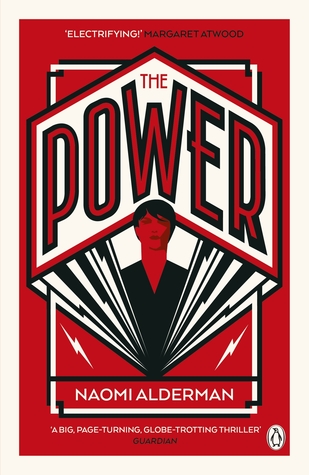
Book Title: The Power
Author: Naomi Alderman
Date Started: September 16th 2017
Date Completed: September 26th 2017
Genres: Sci-Fi, Thriller
Quality Rating: Four Stars
Enjoyment Rating: Three Star
Quality Rating: Four Stars
Enjoyment Rating: Three Star
Final Rating: Three stars
Review:
The Power is a science-fiction(ish) thriller through and through, that's stepped out of its bounds into some gender politics, but without conviction. It's a victim of its own success in the way that it's not the kind of book that it's been made out to be - which is a shame because what it actually is in concept isn't a bad novel.
The big hype around this book is its look at women and their relationship to power when suddenly they all develop the ability to strike electricity from their bodies. It definitely makes you think about misogyny when the roles are reversed; men having to have registered female guardians; men being harassed on the street because the women feel powerful; women thinking that men want to be shocked during sex because it's 'excitingly dangerous' etc. But I wouldn't call it feminism. Yes, the conclusions we might eventually draw in some way support the desire to get rid of stiff gender roles and expectations, but the events that happen are women becoming superior to men - which is not feminism. What worries me about this book is that it's being heralded as a work of feminist literature but it's showing the wrong way to deal with gender violence, and some people aren't going to read the satire underneath.
Alderman is clearly a thriller writer - and a good one in that respect. But I don't think thriller was the right genre to explore this story in. Yes, the 'power' strongly influences and drives the events in the book, but half of the time we're looking at the drug trade and journalism in war zones, just with the gender swapped around. It doesn't make much of a difference in the end. I almost wish a different writer had taken this idea and ran with it, because I think a more focused exploration on what's actually happening to the politics and culture would've been more interesting. In all fairness, I don't think this was ever intended to be a literary comment on misogyny. But, again, it's a victim of its own success in that way, and now isn't able to stand up to what people expect of it.
There were so many different directions this story could've gone in. There was so much you could've done with it, that I'm a little puzzled with the choices that Alderman went with. Again, the thriller angle didn't fit it for me, but I think she knew there was a lot to be done with the idea. But instead of choosing the best bits and focusing on them, or even trying to give a brief view over lots of diverse areas, we end up with a book that simultaneously tries to do too much with too many characters, and ends up doing very little at all. We've got six(ish) protagonists that are in different places in the world but actually have somewhat similar backgrounds and desires. I would've been interested to see what women in absolute poverty went after they got the power - and not just in one chapter where the journalist writes an article about them. Because of this, when we reached the end, I was underwhelmed because I hadn't really connected with any of the characters (either through their lack of diversity from each other or because I never got to spend enough time with each of them). Not that there was any sort of clear triumph or tragedy by the end anyway. I'm all for quiet endings, but I'd all but settled on the fact that this was a thriller novel by then.
I'm left with the confusion that I can't tell if the female rebellion of dominance was at the centre of this book, or a means to an end. In basic terms, all I can see the reversal of roles being used for is to create a tense environment. It's not really saying anything (constructive, anyway) about gender roles. And in that way it's successful: the mix-up of hierarchy puts the reader on uneven footing, where we're not completely sure how things are going to work out because it's not what we first expect. But at the same time, in our culture when you write something that so graphically addresses gender violence and aggression, you have to accept that it means something. I feel like The Power doesn't own up to the responsibility of what it's saying. Does it even know what's it's saying? Is it actually saying anything?!
I was interested in reading The Power mainly because it won the Baileys prize, as I'm sure a lot of people were. It probably won it as one of the more accessible books from the selection, but that's because it's not literary fiction. Not that it should have to be, of course, but I think that while this novel might be a gateway book into more complex literary stories, it falls short in too many places to stand up to what people are calling it.
Not sure now if I want to read it or not....
ReplyDelete